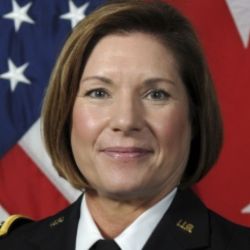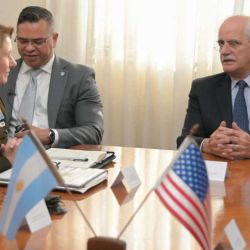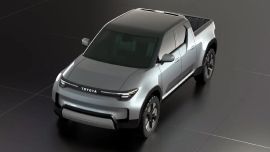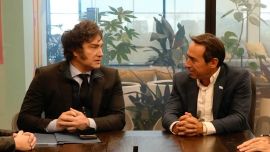Chief of the United States Southern Command General Laura J. Richardson has been touring the Southern Cone, working to boost Washington’s influence at the end of the Americas at a time of competition with China and increasing Asian influence.
Under the premise of reinforcing “cooperation and security,” the four-star general met up with Argentine and Chilean officials, participated in military activities in Patagonia and sent a message respecting the strategic importance of the region and its resources for US security.
Richardson carried out a hermetic protocol visit, especially in the case of Argentina. The chief military officer for US interests in South America met up with top brass in Buenos Aires and then headed to Chile where she showed up in Punta Arenas and toured the Magellan Straits.
Regarding the Antarctic, the South Atlantic enclave takes on strategic importance considering Washington’s concern about the Polo Logístico Antártico project pushed by the Argentine government in Ushuaia and Tierra del Fuego, given the possibility of Chinese and Russian capital. Another item high up the agenda was lithium, one of the resources forming part of the US "strategy of security” in the region.
Agenda in Argentina
Richardson was in Buenos Aires on April 17, the third US official to visit the country after the meeting between US President Joe Biden and Argentina’s leader Alberto Fernández on March 29 in Washington. Her visit preceded by Christopher Hanson, who chairs the Nuclear Regulatory Commission, and by Wendy Sherman, the second-in-command at the US State Department, both of whom visited the capital and beyond in a month marked by payments of US$2.6 billion to the International Monetary Fund (IMF), heightening Argentina’s need for Washington’s support on that front.
Richardson was received by US Ambassador Marc Stanley amid a tight agenda that included a meeting with Defence Minister Jorge Taiana and the head of the Joint Chiefs-of-Staff Juan Martín Paleo.
Little emerged as to her interchange with those officials. As far as Perfil could ascertain, there were no concrete advances in issues concerning US-Argentine relations, among them the request for diplomatic assistance with the United Kingdom to unblock the purchase of F-16 and F-18 Hornet aircraft to replace the Mirages in a transaction which has been pending since the Malvinas conflict.
“Southern Command chief General Laura Richardson and Armed Forces Joint Chiefs-of-Staff head General Juan Martín Paleo met in Argentina to discuss security cooperation. Argentina makes a key contribution to regional security and global peace-keeping,” ran the official statement following the meeting between the two.
Consulted by this newspaper, a hermetic Paleo was categorical – “There is nothing more to add” – while the Foreign Ministry ratified that the meeting aimed at military cooperation was organised by the US Embassy and the Defence Ministry without giving more details.
Taiana limited himself to tweeting that the conversations revolved around "international peace-keeping operations and disaster assistance."
Richardson in Chile’s south
Richardson spent three days in Chile where she met its Defence Minister Maya Fernández shortly before President Gabriel Boric announced a new public-private partnership for lithium exploitation. She carried out various military activities, meeting up with Chilean Army Commander-in-Chief Javier Iturriaga.
Richardson then travelled to Punta Arenas and toured the Magellan Straits, which divide Chile from the island of Tierra del Fuego, where she highlighted the value of the Antarctic.
"The Antarctic continues to be vital for international scientific research and development," she indicated via the social networks of the Southern Command, affirming "continuous support for the research efforts and discussing the strategic importance of the region."
The calibre of the officials visiting in April highlights Washington’s moves to boost its presence in the region and counter Chinese presence. In Argentina’s case, a delegation of the Chinese armaments industry arrived early this month and met up with Defence Minister Taiana “to boost the cooperation between defence industries.” To this should be added the possibility of Argentina purchasing JF-17 Thunder aircraft jointly manufactured by China and Pakistan to dodge the UK veto of the sale of aircraft containing British parts to Argentina in the framework of the conflict over South Atlantic sovereignty.
China and the ‘lithium triangle’
An underlying motive for the trip was to dampen the advances in Sino-Argentine nuclear and military cooperation with a focus on lithium where Argentina together with Chile and Bolivia accounts for "60 percent of the world reserves" of this key input for the telecommunications industry and 5G (for the use of batteríes), one of the main areas of Sino-American competition. Chile has its biggest reserves in the Atacama desert where the contracts have gone to Chilean and Chinese capital.
"China has broadened its capacity to extract resources, establish ports and manipulate governments via its rapacious investments," commented General Richardson to the US Congress in early March.
Prior to heading to the bottom of the continent, Richardson had made clear her stance in a January video from an event of the Atlantic Council think tank linked to NATO. "Why is Latin America important ?" she asked, highlighting in the first place "the lithium triangle," a strategic zone shared by Argentina, Bolivia and Chile where most of the world’s lithium is produced, highly "necessary for today’s technology."
Other aspects of the region then highlighted by the general were the concentration of "huge oil reserves" and "the lungs of the world" in reference to the Amazon and the copper and gold of Venezuela, among others.
"Why is this region important? With all its wealth of resources and land, we have 31 percent of the world’s fresh water. That inventory gives the United States plenty to do, this region does matter and has a lot to do with national security. We have to raise our game," she concluded.





















Comments